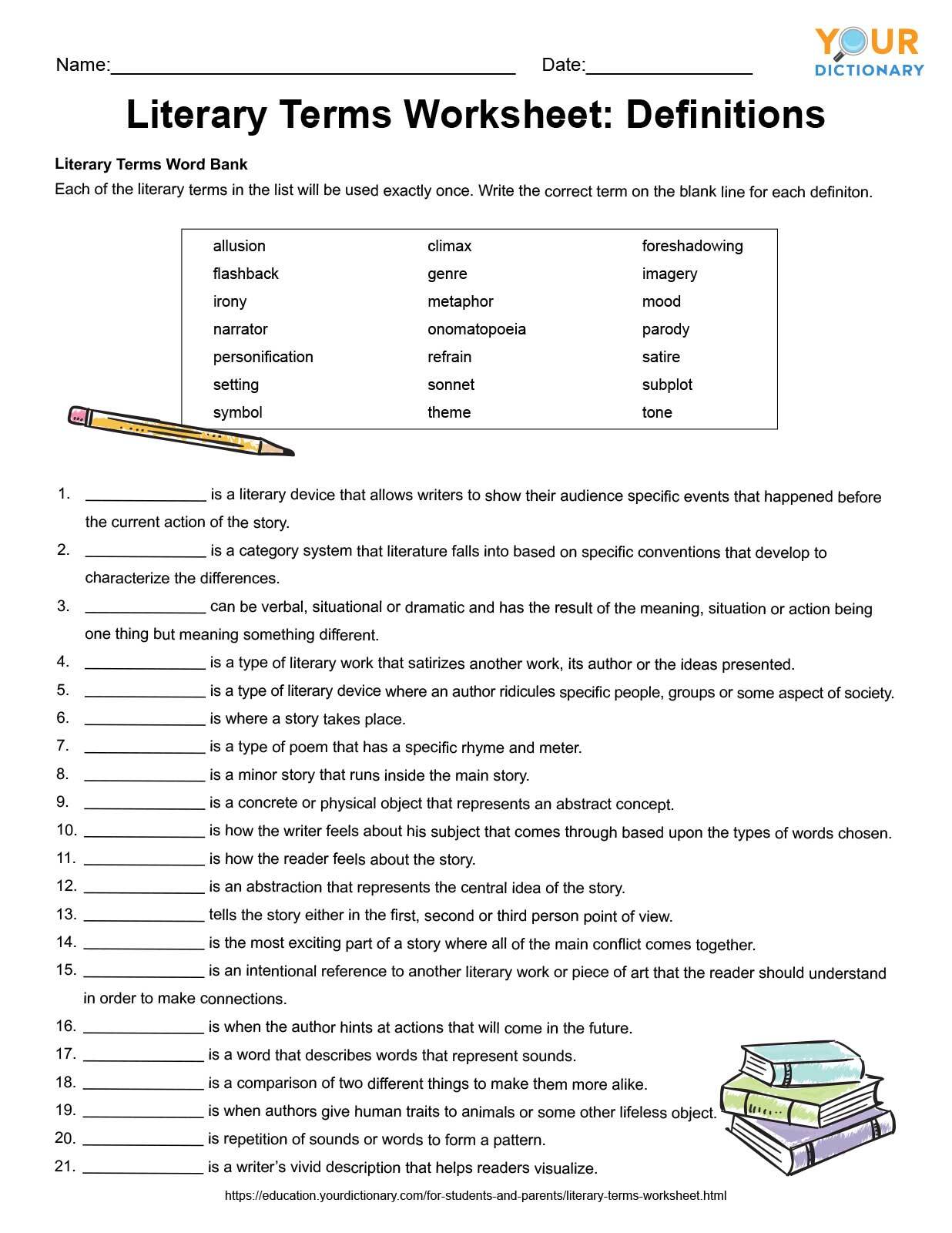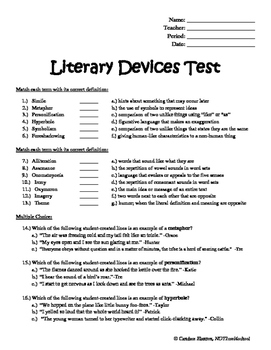Ever wondered about the hidden language of literature? Those strange words that pop up in essays and book discussions? Well, you’re not alone! Understanding literary terms is essential for digging deeper into the stories, poems, and plays we encounter. But fear not, literary analysis doesn’t need to be a closed club. This guide will equip you with the knowledge and resources to tackle any literary terms test, including a PDF of sample questions and answers to help you practice.

Image: education.yourdictionary.com
Imagine reading a classic like “Pride and Prejudice” and suddenly stumbling upon a reference to “irony.” Does it just seem like a coincidence? Or is there something more profound at play? The answer lies in understanding literary terms. By grasping concepts like irony, metaphor, or symbolism, we can unlock deeper layers of meaning and appreciate the artistry of literature. This understanding isn’t just for literary academics – it’s for anyone who enjoys reading and wants to engage more fully with the stories they love.
Introducing the Basics:
Literary terms, sometimes called “literary devices,” are the tools of the trade for writers. They are specific techniques that writers use to create meaning, evoke emotions, and shape our understanding of the world within the text. Think of them as building blocks for constructing literary works.
Common Literary Devices:
Here are some of the most frequently encountered literary terms:
- Metaphor: A comparison between two unlike things without using “like” or “as.” Example: “Love is a battlefield.”
- Simile: A comparison using “like” or “as.” Example: “Her eyes were like stars.”
- Personification: Giving human qualities to non-human things. Example: “The wind whispered secrets.”
- Symbolism: Using an object or image to represent a broader idea or concept. Example: A dove often symbolizes peace.
- Irony: A literary device where there is a difference between what is said and what is meant, or what is expected and what happens.
- Verbal irony: Saying the opposite of what is meant. Example: “That’s just great.”
- Situational irony: A twist of fate, where the outcome is the opposite of what was expected. Example: A fire station burning down.
- Dramatic irony: The audience is aware of something that the characters in the story are not. Example: In a horror movie, when the character walks into a dark room, but the audience has seen the killer hiding there.
- Imagery: Using vivid language to appeal to the reader’s senses. Example: “The soft, golden light of the setting sun.”
- Alliteration: Repetition of consonant sounds at the beginning of words. Example: “Peter Piper picked a peck of pickled peppers.”
- Assonance: Repetition of vowel sounds within words. Example: “The rain in Spain falls mainly on the plain.”
- Onomatopoeia: Words that imitate sounds. Example: “Buzz,” “sizzle,” “crash.”
- Hyperbole: Exaggeration for effect. Example: “I’m so hungry I could eat a horse.”
- Understatement: The opposite of hyperbole, intentionally downplaying something. Example: “It’s a bit chilly outside.”
Expanding Your Knowledge:
While these are just a few examples, the world of literary terms is vast. There are countless other devices that contribute to the richness and complexity of literature.

Image: www.teacherspayteachers.com
Going Beyond the Basics:
To truly master literary terms, it’s helpful to explore beyond the most common ones. Here are some areas to delve into:
- Literary Theory: This field explores different ways of interpreting and analyzing literature. Key figures include:
- Feminist literary theory: Examines gender roles and their representation in literature.
- Marxist literary theory: Analyzes class relations and power dynamics in literary works.
- Postcolonial literary theory: Focuses on the impact of colonialism on literature and culture.
- Poetry Terms: Poetry often utilizes specific techniques that are unique to the genre.
- Meter: The rhythm of a poem, often determined by the number of syllables per line and the pattern of stressed and unstressed syllables.
- Rhyme: The use of words that sound alike, creating a musical effect.
- Stanza: A group of lines in a poem, often separated by a space.
- Figurative language: Metaphors, similes, and other devices are particularly prevalent in poetry.
- Drama Terms: Understanding dramatic structure and performance conventions is essential for comprehending plays.
- Dialogue: Speech between characters.
- Monologue: A long speech by a single character.
- Aside: A comment delivered directly to the audience, often unheard by other characters.
- Stage directions: Notes for actors and directors, indicating movement, set design, and other aspects of the performance.
Taking Your Skills to the Next Level:
The best way to truly internalize literary terms is through practice!
Tips for Mastering Literary Terms:
- Read Widely: The more you read, the more you’ll encounter these terms in action.
- Active Reading: Pay attention to how writers use language and try to identify the techniques they employ.
- Annotate Your Reading: Highlight passages where you recognize specific literary terms.
- Practice Writing: Try incorporating literary devices into your own writing.
- Study Guides and Resources: There are many online resources, including websites, videos, and articles that provide definitions and examples of literary terms.
Your Guide: Literary Terms Test with Answers PDF:
To aid your journey in mastering literary terms, we’ve compiled a Literary Terms Test with Answers PDF. This resource will provide you with a comprehensive test featuring a variety of questions to challenge your knowledge.
What You’ll Find in the PDF:
- Definitions: Clear and concise definitions for essential literary terms.
- Examples: Real-life examples of these terms in action, taken from different literary works.
- Practice Questions: A range of questions to test your understanding, from simple identification to more analytical tasks.
- Answer Key: Complete answers to each question, helping you gauge your progress and identify areas for further study.
Download the Literary Terms Test with Answers PDF (link to download file)
Literary Terms Test With Answers Pdf
https://youtube.com/watch?v=P6n3BqvRKeo
A World of Stories Awaits:
By understanding literary terms, you unlock a whole new world of meaning and appreciation for literature. You’ll be able to analyze characters, themes, and storylines more keenly. You’ll also be able to delve into critical discussions and engage with other readers on a deeper level. So go forth and explore – the world of literature is waiting to be discovered!
Further Resources:
- Purdue OWL: https://owl.purdue.edu/owl/
- SparkNotes: https://www.sparknotes.com/
- Literary Terms: https://literarydevices.net/
Share Your Experience:
Have you encountered any particular literary terms that have fascinated you? Share your insights in the comments below!






